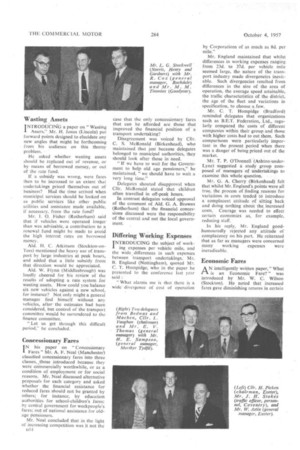Wasting Assets INTRODUCING a paper on " Wasting I Assets,"
Page 56

If you've noticed an error in this article please click here to report it so we can fix it.
Mr. H. Jones (Lincoln) put forward points designed to elucidate any new angles that might be forthcoming from his audience on this thorny problem.
He asked whether wasting assets should be replaced out of revenue, or by means of borrowed money, or out of the rate fund.
If a subsidy was wrong, were fares then to be increased to an extent that undertakings priced themselves out of business? Had the time arrived when municipal services should be looked on as public services like other public utilities and assistance made available, if necessary, from the rate fund?
Mr. I. 0. Fisher (Rotherham) said that if vehicles were operated longer than was advisable,a contribution to a renewal fund might be made to avoid the high interest rates on borrowed money.
Ald. H. C. Atkinson (Stockton-onTees) mentioned the heavy use of transport by large industries at peak hours, and added that a little subsidy from that direction would be appreciated.
Aid. W. Flynn (Middlesbrough) was loudly cheered for his review of the results of adopting a rate system for wasting assets. How could you balance six new vehicles against a new school, for instance? Not only might a general manager find himself without any vehicles, after the estimates had been considered, but control of the transport committee would be surrendered to the finance committee.
"Let us get through this difficult period," he concluded.




















































































































